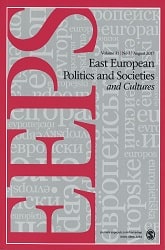“The Past Is Never Dead”. Identity, Class, and Voting Behavior in Contemporary Poland
“The Past Is Never Dead”. Identity, Class, and Voting Behavior in Contemporary Poland
Author(s): Krzysztof JasiewiczSubject(s): Civil Society, Political history, Government/Political systems, Electoral systems, Behaviorism, Crowd Psychology: Mass phenomena and political interactions, Transformation Period (1990 - 2010), Sociology of Politics, Identity of Collectives
Published by: SAGE Publications Ltd
Keywords: Poland; voting behavior; elections; history; partitions;
Summary/Abstract: This article presents a summary of analyses addressing the changing patterns of voting behavior in post-communist Poland as a context for examination of the issue of the relationship between regions defined by history (eighteenth-century partitions, border shifts after WWII) and contemporary forms of voting behavior. In the 1990s, the dominant cleavage in Polish politics was the one between the post-Solidarity and postcommunist camps, and the best predictor of voting behavior was one’s religiosity. In the first decade of the twenty-first century, this cleavage has been replaced by another, between the liberal, pro-European orientation and the more Euro-skeptic, populist attitudes. The empirical evidence seems to suggest that one end of the populist–liberal continuum is relatively well defined and represents the traditional system of values, which defines Polish national identity in terms of ethnic nationalism, strong attachment to Catholic dogmas, and denunciation of communism as a virtual negation of those values. The other end of this continuum is defined more by rejection of this nationalistic-Catholic “imagined community” than by any positive features. This article examines the relative role of identity-related factors (e.g., religiosity or region) and determinants based on one’s socioeconomic (class) position in shaping voting patterns in the 2007 elections to the Polish Sejm and Senate. The empirical data come from a postelection survey, the Polish General Election Study 2007.
Journal: East European Politics and Societies
- Issue Year: 23/2009
- Issue No: 04
- Page Range: 491-508
- Page Count: 18
- Language: English
- Content File-PDF

